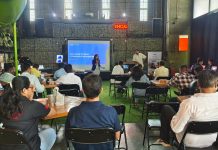The Office of Principal Scientific Adviser to the Government of India issues simple guidelines, with precautions and measures, for controlling the spread of COVID-19 in densely populated areas. In particular, these relate to areas where toilets, washing or bathing facilities are shared.
The key goal of the proposed measures is to emphasise sanitation and hygienic practices and suggest key interventions that can greatly help in controlling the spread of the disease.
Addressing the urgent need to proactively put in place more mechanisms that enable regular hand-washing by residents in these communities, the guidelines propose swift installation of do-it-yourself hand-washing stations that have been used world-wide to contain epidemics.
Foot-operated stations not only reduce the chance of transmission by eliminating direct contact with potentially high infection areas, but also reduce the amount of water used by people during hand-washing.
Designs proposed allow self-assembly by community volunteers and authorities, using affordable and locally available materials, even during lockdown and supply- chain challenges.
Installing permanent foot operated stations in public and community toilets encourages hand washing while reducing water use.
Chlorinating the water dispensed at such hand washing stations adds additional effectiveness and should be considered.
An outline of good toilet practices to maintain sanitation and hygiene in communities have also been clearly outlined. Simple measures such as the need to always wear face-covers and footwear in the toilet, washing hands immediately after use and maintaining social-distancing have been highlighted.
Disinfectants to keep public areas and homes clean and sanitised have also been detailed.
The guidelines emphasise on the need for ensuring that authorities, volunteers and communities co-manage these solutions to ensure sustainability. They also emphasise the need for full cooperation and respect for all frontline workers and sanitation staff who are playing a critical role in ensuring the containment of the disease.
Prof K. VijayRaghavan, Principal Scientific Adviser to Government of India emphasizes that “In our push against the COVID-19 pandemic, India has come together to apply the most effective enabling measures appropriate to each context. Our densely populated places, Dharavi is but one example, need special attention. The manual, put together by the team at the PSA’s office, brings out how frugal but effective tools can have disproportionate positive impact. Sites of community interaction, such as common toilets and bathing areas are the focus. Community leaders, NGOs, corporates etc. are urged to implement these and other measures ”.
It is suggested that corporates, NGOs, and organisations looking to support tangible interventions that will help contain the disease especially in densely populated urban areas, adopt, support and sponsor solutions presented in these guidelines and work with communities and volunteers to implement them.
These guidelines will be made available in all our languages starting with Hindi, Marathi and Urdu, in addition to English.





